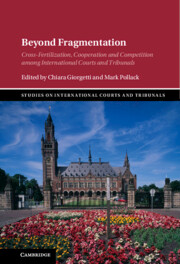 Beyond Fragmentation
Beyond Fragmentation Book contents
- Beyond Fragmentation
- Studies on International Courts and Tribunals
- Beyond Fragmentation
- Copyright page
- Dedication
- Contents
- Contributors
- Foreword
- Preface
- 1 Beyond Fragmentation
- 2 The Procedural Cross-Fertilization Pull
- 3 Procedural Convergence in International Courts and Tribunals
- 4 New Media Evidence across International Courts and Tribunals
- 5 The Acquis Judiciaire, a Tool for Harmonization in a Decentralized System of Litigation?
- 6 Why Cite External Legal Sources?
- 7 Of Gardeners and Bees
- 8 A View from the Coal Face
- 9 Agents of Cross-Fertilization
- Index
5 - The Acquis Judiciaire, a Tool for Harmonization in a Decentralized System of Litigation?
A Case Study in the Law of the Sea
Published online by Cambridge University Press: 28 April 2022
- Beyond Fragmentation
- Studies on International Courts and Tribunals
- Beyond Fragmentation
- Copyright page
- Dedication
- Contents
- Contributors
- Foreword
- Preface
- 1 Beyond Fragmentation
- 2 The Procedural Cross-Fertilization Pull
- 3 Procedural Convergence in International Courts and Tribunals
- 4 New Media Evidence across International Courts and Tribunals
- 5 The Acquis Judiciaire, a Tool for Harmonization in a Decentralized System of Litigation?
- 6 Why Cite External Legal Sources?
- 7 Of Gardeners and Bees
- 8 A View from the Coal Face
- 9 Agents of Cross-Fertilization
- Index
Summary
The law of the sea is a great laboratory for observing the fabric of international law through the interactions between a variety of judicial bodies with jurisdiction to interpret and apply the same legal rules and principles. At first, the plurality of judicial fora available under UNCLOS has created concerns of fragmentation and of competition and forum shopping. These have proved so far unwarranted, since the tribunals generally deliver a uniform interpretation of the applicable law or tend at least toward harmonization. Tribunals have aimed to achieve clarity and consistency of the case law as well as transparency and predictability of the delimitation process. The concept of acquis judiciaire has been used to designate this mechanism of gradual building of a uniform law through the reiteration and cross-referral to existing judicial decisions. It is both a concept and a regulatory tool. It underlies a wilful search of harmonization and shows that judges are essential actors for ensuring the coherence of the international legal system.
Keywords
- Type
- Chapter
- Information
- Beyond FragmentationCross-Fertilization, Cooperation and Competition among International Courts and Tribunals, pp. 128 - 161Publisher: Cambridge University PressPrint publication year: 2022


